
Fannie Edgar Thomas, born 1870 in Chicago, Illinois, dead 1925, was an American author. [1]

Fannie Edgar Thomas, born 1870 in Chicago, Illinois, dead 1925, was an American author. [1]
The death of her father threw her upon her own resources while she was only a girl. She became a book-keeper in a publishing house, and worked hard and faithfully. As a diversion she wrote a small book during her leisure hours, which she published clandestinely by the aid of a printer. All the work was done outside of business hours. She signed the volume with the cabalistic pen-name, "6-5-20," and the venture was successful, clearing her a comfortable sum of money. The small edition was soon exhausted. The book attracted the attention of Ella Wheeler Wilcox, who invited the author to New York City and took her into her home. She soon became a contributor of taking sketches and essays, and the identity of "6-5-20" was established. Later she used her own full name. [1]
She wrote for three New York magazines, the Sunday World , the Recorder and the Sun, but still economic independence was hard to achieve for a self-supporting woman. [2]
Organ Loft Whisperings, The complete writings from Paris 1893-1894 by Fannie Edgar Thomas, at the time "Church Music Correspondent to New York's Musical Courier , were compiled and edited by Agnes Armstrong.

Louisa May Alcott was an American novelist, short story writer, and poet best known as the author of the novel Little Women (1868) and its sequels Little Men (1871) and Jo's Boys (1886). Raised in New England by her transcendentalist parents, Abigail May and Amos Bronson Alcott, she grew up among many well-known intellectuals of the day, such as Margaret Fuller, Ralph Waldo Emerson, Nathaniel Hawthorne, Henry David Thoreau, and Henry Wadsworth Longfellow.

Harriet Elisabeth Beecher Stowe was an American author and abolitionist. She came from the religious Beecher family and became best known for her novel Uncle Tom's Cabin (1852), which depicts the harsh conditions experienced by enslaved African Americans. The book reached an audience of millions as a novel and play, and became influential in the United States and in Great Britain, energizing anti-slavery forces in the American North, while provoking widespread anger in the South. Stowe wrote 30 books, including novels, three travel memoirs, and collections of articles and letters. She was influential both for her writings and for her public stances and debates on social issues of the day.

Fannie Lou Hamer was an American voting and women's rights activist, community organizer, and a leader in the civil rights movement. She was the vice-chair of the Freedom Democratic Party, which she represented at the 1964 Democratic National Convention. Hamer also organized Mississippi's Freedom Summer along with the Student Nonviolent Coordinating Committee (SNCC). She was also a co-founder of the National Women's Political Caucus, an organization created to recruit, train, and support women of all races who wish to seek election to government office.

Nathaniel Parker Willis, also known as N. P. Willis, was an American author, poet and editor who worked with several notable American writers including Edgar Allan Poe and Henry Wadsworth Longfellow. He became the highest-paid magazine writer of his day. His brother was the composer Richard Storrs Willis and his sister Sara wrote under the name Fanny Fern. Harriet Jacobs wrote her autobiography while being employed as his children's nurse.

Fannie Flagg is an American actress, comedian and author. She is best known as a semi-regular panelist on the 1973–1982 versions of the game show Match Game and for the 1987 novel Fried Green Tomatoes at the Whistle Stop Cafe, which was adapted into the 1991 motion picture Fried Green Tomatoes. She was nominated for an Academy Award for the screenplay adaptation. Flagg lives in California and Alabama.
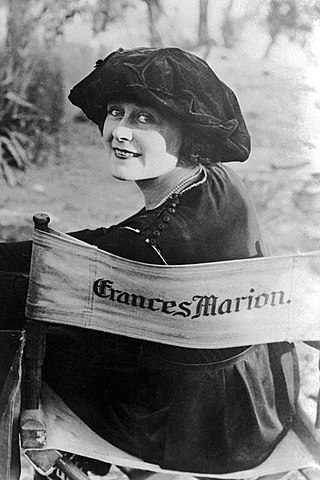
Frances Marion was an American screenwriter, director, journalist and author often cited as one of the most renowned female screenwriters of the 20th century alongside June Mathis and Anita Loos. During the course of her career, she wrote over 325 scripts. She was the first writer to win two Academy Awards. Marion began her film career working for filmmaker Lois Weber. She wrote numerous silent film scenarios for actress Mary Pickford, before transitioning to writing sound films.

Marietta Holley, was an American humorist who used satire to comment on U.S. society and politics. Holley enjoyed a prolific writing career and was a bestselling author in the late 19th century, though she was largely forgotten by the time of her death. Her writing was frequently compared to that of Mark Twain and Edgar Nye. Along with Frances Miriam Whitcher and Ann S. Stephens, Holley is remembered as one of America's most significant early female humorists. Holley's work appealed to all classes of society. Her readers are scattered over the entire world and include men and women of every station and grade. Her books are widely read in Europe.

Fannie Hurst was an American novelist and short-story writer whose works were highly popular during the post-World War I era. Her work combined sentimental, romantic themes with social issues of the day, such as women's rights and race relations. She was one of the most widely read female authors of the 20th century, and for a time in the 1920s she was one of the highest-paid American writers. Hurst also actively supported a number of social causes, including feminism, African American equality, and New Deal programs.
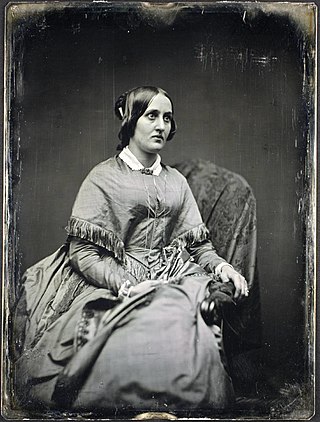
Sara Jane Lippincott was an American author, poet, correspondent, lecturer, and newspaper founder. One of the first women to gain access into the Congressional press galleries, she used her questions to advocate for social reform and women's rights.

Augusta Jane Evans Wilson, was an American author of Southern literature and a patriot of the South. She was the first woman to earn US$100,000 through her writing.
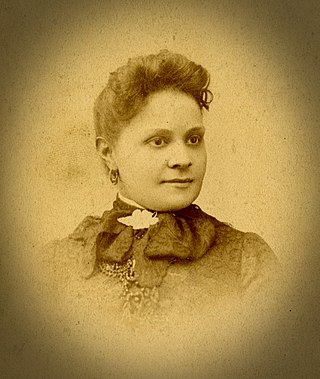
Frances "Fannie" Barrier Williams was an African American educator, civil rights, and women's rights activist, and the first black woman to gain membership to the Chicago Woman's Club. She became well known for her efforts to have black people officially represented on the Board of Control of the World's Columbian Exposition in 1893. She was also a musician, a portraitist and studied foreign languages.
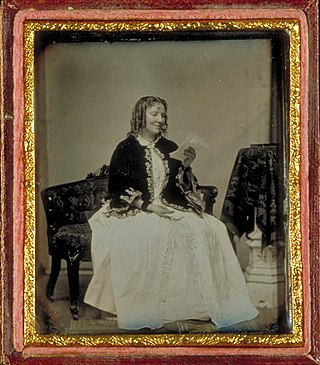
Anna Cora Mowatt Ritchie was a French-born American author, playwright, public reader, actress, and preservationist. Her best known work was the play Fashion, published in 1845. Following her critical success as a playwright, she enjoyed a successful career on stage as an actress. Her Autobiography of an Actress was published in 1853. Anna Cora Mowatt played a central role in lobbying and fundraising during the early years of the Mount Vernon Ladies' Association, the oldest national historic preservation organization in the United States.

Adeline E. Knapp was an American journalist, author, social activist, environmentalist and educator, who is today remembered largely for her tempestuous lesbian relationship with Charlotte Perkins Gilman. In her lifetime, Knapp was known as a fixture of the turn-of-the-century San Francisco Bay Area literary scene. An outspoken writer who often addressed controversial topics in her columns for The San Francisco Call, Knapp wrote on a wide range of subjects from livestock to the Annexation of Hawaii. Though often drawn to progressive causes like child labor and conservation, Knapp also tended to espouse reactionary views, as evidenced by her Anti-Chinese sentiments and criticisms of the women's suffrage movement. At a time when many American women were joining the movement to extend political and voting rights to women, Knapp spoke in state senate hearings in New York expressing doubts about the benefits of suffrage to women, and she allowed her speeches and letters on the topic to be used as propaganda by the anti-suffragism movement. Knapp was also the author of numerous short stories, as well as a novel set in the Arizona desert—works reflecting her outdoor enthusiast sensibilities, keen intellect, and interest in Western regionalism. These works, though praised in her lifetime, today have few readers among enthusiasts of Western fiction.
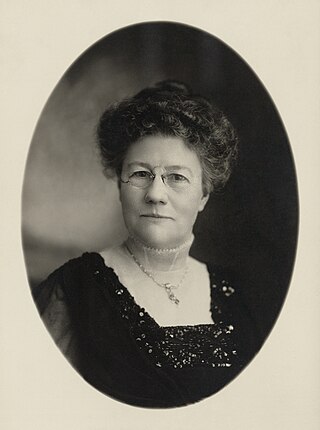
Ida Husted Harper was an American author, journalist, columnist, and suffragist, as well as the author of a three-volume biography of suffrage leader Susan B. Anthony at Anthony's request. Harper also co-edited and collaborated with Anthony on volume four (1902) of the six-volume History of Woman Suffrage and completed the project by solo writing volumes five and six (1922) after Anthony's death. In addition, Harper served as secretary of the Indiana chapter of the National Woman Suffrage Association, became a prominent figure in the women's suffrage movement in the U.S., and wrote columns on women's issues for numerous newspapers across the United States. Harper traveled extensively, delivered lectures in support of women's rights, handled press relations for a women's suffrage amendment in California, headed the National American Woman Suffrage Association's national press bureau in New York City and the editorial correspondence department of the Leslie Bureau of Suffrage Education in Washington, D.C., and chaired the press committee of the International Council of Women.

Hattie Tyng Griswold was an American author of the long nineteenth century. She wrote many stories, sketches, and poems. Born in Boston, Griswold relocated with her family to Columbus, Wisconsin, in 1850, where, in the course of time, she married, raised her children, and did much of her work as an author. Her home was a meeting place of many of the notable people of the day, for she had an extensive personal acquaintance with literary and other celebrities. The books by which she is best-known are: Apple Blossoms, Waiting on Destiny, Lucile and Her Friends, and The Home Life of Great Authors. "Under the Daisies" is one of her best-known poems. She wrote stories for the Home Journal of New York, The Knickerbocker, Madison State Journal, Old and New, The Christian Register, and Boston Commonwealth. Griswold served as president of the Woman's Christian Temperance Union in her locale.

Mabelle Biggart was an American educator, dramatic reader, preacher, and writer. In 1890, Biggart was in charge of the department of elocution at the Chautauqua assembly of Glen Park, Colorado, and that she was giving exercises illustrating the Delsarte System. Around the same time, she had been instrumental in starting the Polytechnic Institute and Woman's Athletic Club of Denver, intended to aid women to gain health, strength, and beauty. She had also assumed charge of a "Polytechnic Department" in the Denver NewsLetter, devoting the space to physical culture, science, and literature. She wrote articles for various publications including, "A Woman that is a Woman", "List to the Voice!", "Newfoundland", "Where is the New Woman?", "Dr. Grenfell's Labrador Mission", and "On the Painted Desert".

Sarah Frances "Fannie" Gerry Wilder was an American author.

Fanny Purdy Palmer was an American author, poet, journalist, lecturer, social activist, and clubwoman. She began club work in 1876 and was one of the originators of the General Federation of Women's Clubs. She served as president of the Rhode Island Woman's Club, was a member of the school committee of the city of Providence, Rhode Island, and was connected with various philanthropic and social movements, including women's suffrage. A diligent reader of some of the best scientific and metaphysical works, for many years, she was a writer of stories which appeared in various weekly and monthly publications, stories which have dealt with the problems of life.

Frances Brackett Damon was an American writer of poetry, short stories, essays, playlets, and novels. She was also an editor of the literary magazines, The Quiet Hours and The Tally Ho. She wrote many short stories for young persons, and some reform correspondence. Among her works are the poetry collection, The Bodfish Road (1901), the novel, Idlewise, the novelette, A Daughter of Pharaoh, and a long poem, “The Wind-Flower". Her songs were probably the best known of her verse, several having been used officially by the Woman's Christian Temperance Union (WCTU) and two at least having been adopted by foreign countries and sung at World WCTU conventions.

Lena Richard was a chef, cookbook author, restaurateur, frozen food entrepreneur, and television host from New Orleans, Louisiana. In 1949, Richard became the first Black woman to host her own television cooking show. Her show aired from October 1949 - November 1950 on local television station WDSU.